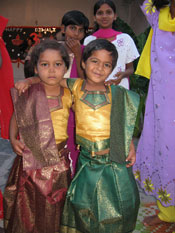There are no limits to the cruelties that humans inflict on one another, and slavery—particularly the trafficking of children—may be at the apex of depravity. An estimated 27 million are enslaved worldwide. Jody Hassett Sanchez’s documentary Sold (Pointy Shoe Productions) profiles three rescuers—a Hindu, a Christian, and a Muslim—who are trying to make a dent in that number.

“When we do prostitution, we see only hell,” says Manisha, a sex slave rescued by Sunitha Krishnan, a former Hindu nun. Trapped indoors for two years, Manisha is one of many women and girls rescued from brothels in India by Krishnan, who helps the girls find fulfilling work and dignity. Though she’s been beaten for her work, Krishnan stays driven by righteous anger—an anger that’s refueled when she hears stories like that of an 8-year-old girl locked in a room with a snake until submitting to prostitution. Krishnan jokes that she worships Ganesh (a Hindu god known as the “Remover of Obstacles”), because “he’s like me, very temperamental, very dominating and loving, too.”
Mercy and healing drive Symphorienne Kessouagni, a Christian working in Togo, West Africa, where she cares for 17 former child slaves, providing shelter, nutrition, education, and more. Painted near the entrance of her home and school is Psalm 34:9: “Fear the Lord, you his saints, for those who fear him lack nothing.”
Kessouagni rescues mostly domestic slaves, like Moise, whose family sold him into market slavery when he was 4 years old. He spent years hauling heavy loads as if he were a cart horse. Kessouagni reunited the boy with his mother, who can only say, “There was no other way for us to survive.” It’s not surprising, then, that Kessouagni teaches these forsaken bought-and-sold children that they have a Father in heaven who loves them.
It’s unfortunate that Hassett Sanchez doesn’t offer more religious context for the work of Ansar Burney, a Muslim attorney in Karachi, Pakistan, who rescues camel jockeys in the Middle East. Despite bans in some countries, young boys are taken to the United Arab Emirates, Kuwait, Oman, and Qatar, among other places, and forced to race camels to entertain the wealthy elite. One young boy, taken at age 3, describes how, while crying for his father, he was beaten, starved, and electrically shocked so that he would stay on his camels. Another young boy saw his brother die. When asked what happened to his brother’s body, he simply says, “They bury them under the sand.”

Burney has won financial restitution for many victims. And while he’s driven by a zeal for righteousness, he doesn’t talk about how his faith informs his work—a missed opportunity, since his enemies are other Muslims.
While these accounts are harrowing, Hassett Sanchez eschews images of suffering in favor of those showing hope. Seeing the happy faces of now-rescued slaves makes child slavery that much more horrible. It’s not just the hubris of someone acting like they own another human that galls; it’s also that their actions rob these children of their happiness.
Each of these three lights in the darkness—Krishnan, Kessouagni, and Burney—exemplifies what it means to act with righteous anger, justice, and love on behalf the least of these.
More:SoldtheFilm.com
Copyright © 2010 Christianity Today. Click for reprint information.










